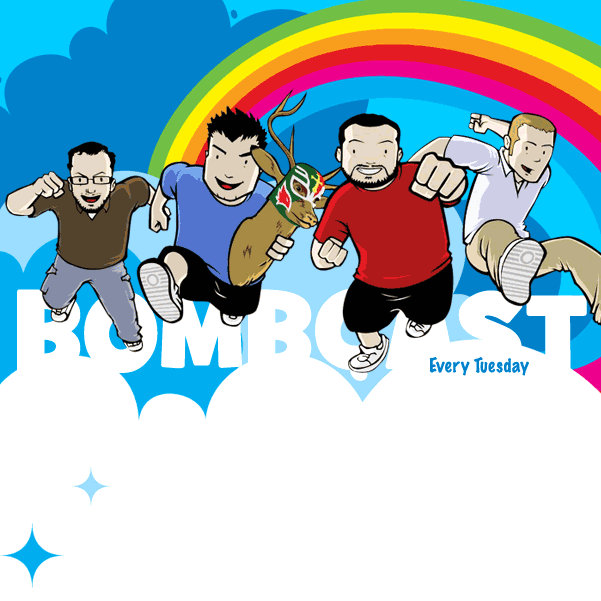This post has not been edited by the GamesBeat staff. Opinions by GamesBeat community writers do not necessarily reflect those of the staff.
I love podcasts of all kinds, especially video game podcasts. I truly believe they are the next step in video game journalism. Unfiltered opinions, usually glazed in a hilarious, metaphorical candy shell, a podcast is a source of news and entertainment. If you’ll excuse another candy metaphor, it’s the Reese’s Peanut Butter Cup of the gaming media.
mmm…podcasts
We get them for free (something I consider the biggest steal available on the Internet,) so take these suggestions/complaints with a large grain of sodium chloride, but if you participate in a podcast or are interested in starting one, here are some helpful dos and don’ts I’ve learned from not only listening to podcasts, but recording my own as well – I’ll put a link to it in the comments if anyone’s interested. These are just guidelines, not hard and fast rules. The only rule of podcasting is to have fun.
DO: Understand your audience your audience and tailor the mood to that audience.
One of the great things about podcasts like the Giant Bombcast and This American Life is you know exactly what you’re getting when you start them up. The Bombcast will be irreverent and light. This American Life tends to take a more serious approach. Decide on the general tone and stick with it.
DON’T: Have the Internet on during recording,
This is, personally, a huge pet peeve of mine. The Internet is a wonderful source of information and can be helpful in resolving debates, but using it during recording can severely hamper the pace of the conversation. The negatives far outweigh the positives.
DO: Keep things upbeat. Nothing is wrong with depth, but never let silence take over the podcast.
Speaking of pace, you gotta keep it high. In this day and age of ever-shortening attention spans, silence equals death. Designate someone as the main host and have them take the reins to keep the pace brisk.
DON’T: Allow vague statements go unexplained.
If someone says “Halo is stupid,” make them justify why. It’s terribly frustrating to let someone be unaccountable for their ridiculous claims. Opinions are great, when they are clear and understandable.
DO: Repeat names often (of games and the people on the episode,) but do it naturally.
People don’t listen to podcasts in a vacuum. Sometimes people miss when you say “Shadow of the Colossus.” Don’t punish them by speaking in vague terms for the rest of the conversation.
And furthermore, let your names be known. Announcing them at the beginning is not enough. Call your fellow podcasters by name. When you’re not a big name podcast like Rebel FM, you can’t get away with just one mention. No offense to the Pixel Revolt guys (who generally do a fine job,) but I consistently mix up Derek, Jeff, Brett, and whatever guest they have on that week’s voices. Then I spend half of the podcast waiting for someone call someone else by name so I can get back on the same page.
DON’T: Rely on gimmicks.
Gimmicks are fun. They are a great way to pull in a quick audience. The problem comes when you’ve got nothing to say once you’ve got your foot in the door. The saying “all sizzle and no steak,” comes to mind. People like steak. Give it to them.
DO: Research your topics, know your shit, double check, and admit when you’re wrong.
This one is extremely important, probably the most important one here – which you can tell by the excellent position I gave it where many of you will casually skip it. Yay sarcasm. If you’re going to talk about a specific game on an episode, make sure people have played it. Know the names of the mechanics. If someone mentions that the green lizard you get in Super Mario Galaxy 2 makes the game more fun, you’d undoubtedly get a few eye rolls from listeners. His name is Yoshi!
And if you find out you screwed up on something after you’re finished recording, make sure to correct yourself in the following episode. It’s usually not a big deal, but it shows you care.
DON’T: Play nice! 
Don’t get me wrong, four assholes around a microphone a good podcast does not make, but conflict is a cornerstone of podcasting. Remember 1up Yours’ infamous arguments between Shane Bettenhausen and Luke Smith? That’s what you should be going for. You can’t force it though, which is why you should pick topics ahead of time to further debate.
DO: Try to stay consistent on time.
When you get a few episodes under your belt and start to gain an audience, they will naturally begin to expect what a typical episode entails. One of the best ways to deliver is to maintain a normal time per episode. This American Life and the Mobcast usually last an hour, Irrational Behavior and Feedback tend to stick around the 45-minute mark, and the Bombcast never seems to be less than two hours. It doesn’t matter how long it lasts, it’s that it stays near that length of time.
DON’T: Don’t have too few or too many people.
A general rule of thumb: With the exception of interview-focused podcasts such as A Life Well Wasted, there should be no fewer than three people or more than five people on any given segment at a time. Having three people allows the scales of disagreement to be tipped, but get more than five and it becomes quite difficult to keep track of everything.
 DO: Listen to your last episode before recording a new one.
DO: Listen to your last episode before recording a new one.
I doubt this one gets done much, but it can be a huge help. No more “did we mention that last week?” or “was that something we said while recording or after?” This is a great way to catch last week’s mistakes, refresh yourself with what the audience knows, and get into the podcasting spirit.
DON’T: Shut out your audience.
This one is pretty obvious. When you’re just starting out, you have to embrace anyone who cares enough to listen to you for upwards of 30 minutes. Even if they offend you, remember that if it wasn’t for them, no one would be listening to you at all and the whole deal would be pointless.
DO: Attribute your info.
This could just be another personal issue I have, but I can’t stand when things go un-attributed. Even if someone “knows their shit,” mistakes can still easily be made. Having attribution to pieces of news, even if it’s just attributing something you wrote on your own blog, gives your stories some credibility they didn’t have before. It also makes it much easier to find errors, which keeps everyone honest.
DON’T: Rest on your laurels.
Routines are good things. They make it easy to deliver on what’s expected of you. An episode of Active Time Babble or any other similarly-styled podcast would feel awkward without the biggest gaming podcast convention of all, the “Whatchu Been Playing” segment.
But at the same time, “familiarity breeds contempt.” The best podcasts are ones that try new things while having a solid core.
DO: Check your tech!
Nothing is worse than sitting down for an hour, having some really meaningful conversations with some friends, cracking some gut-busting jokes, only to find out that your microphones weren’t properly plugged in. Always do a sound check/video check beforehand and look over it immediately afterwards.
Like I mentioned at the beginning, these are just guidelines. There are always exceptions. The most important thing is that you enjoy what your are doing. If you're not, then what's the point?
What are some of your podcast pet peeves? What Do you like audio or video podcasts more? And how do you see them evolving in the future?
